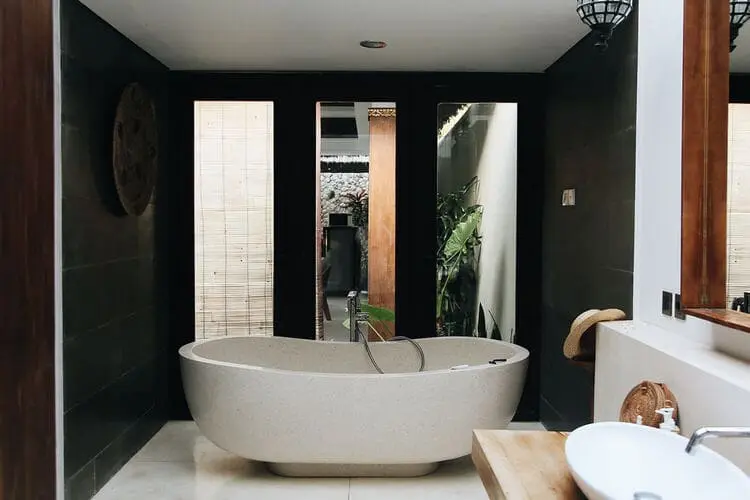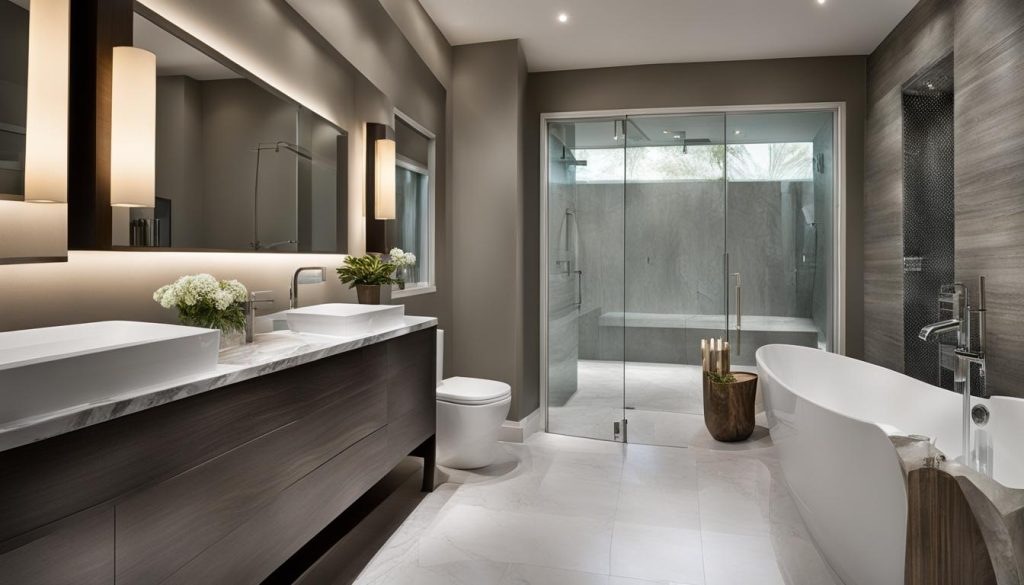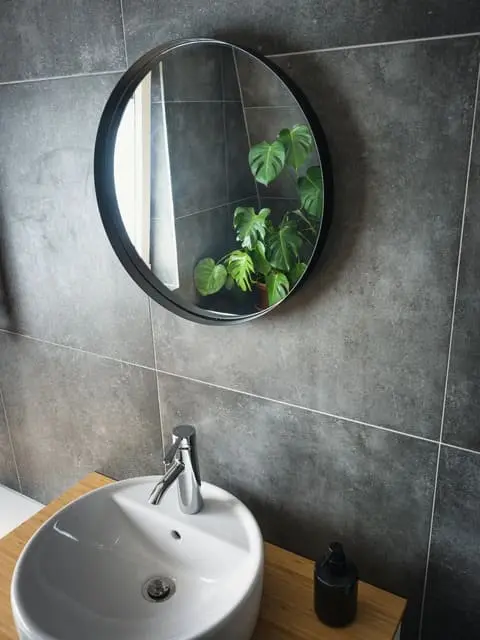What if the secret to a lasting bathroom renovation isn’t just the initial design? After 25 years of transforming Adelaide homes, we’ve learned that daily care often makes the biggest difference to your bathroom floor’s longevity and appeal.
Key Takeaways
- Material-specific methods prevent damage to surfaces
- Daily wipe-downs reduce long-term maintenance needs
- pH-neutral products work best for most modern finishes
- Sealing grout annually helps avoid mould issues
- Correct techniques maintain warranty conditions
- Professional-grade tools aren’t always necessary
- Prevention beats intensive deep-cleaning sessions
At Package Deal Bathrooms, we treat every project like our own. Whether it’s sleek tiles or rustic timber, each material needs tailored care. Our team’s seen how simple cleaning routines prevent wear-and-tear, saving you money and hassle down the track.
This guide shares our hard-won tricks for keeping surfaces spotless. You’ll learn which methods suit porcelain versus vinyl, how to tackle soap scum without harsh chemicals, and why grout deserves extra attention. We’ve even included tips to protect your 10-year warranty through proper upkeep.
Introduction to Bathroom Floor Cleaning Methods
Over 25 years in home renovations has taught us one undeniable truth: proper care determines how surfaces age. At Package Deal Bathrooms, we’ve found that tailored routines protect materials better than any quick fix ever could.
Insights from Our Renovation Experts
Every material tells a different story. Porcelain needs gentle pH-balanced solutions, while natural stone demands specialised treatments. We’ve helped Adelaide homeowners avoid costly mistakes by matching methods to their specific surfaces.
The Power of Consistent Care
Daily wipe-downs do more than keep spaces looking fresh – they stop grime from becoming a permanent guest. Left unchecked, soap residue bonds with minerals in water, creating stubborn films that harbour germs. Simple habits like squeegeeing walls after showers cut bacteria growth by up to 70% in our client surveys.
Three benefits we’ve seen from regular upkeep:
- Preserved warranty conditions on premium finishes
- Reduced allergy triggers through controlled mould
- Longer intervals between deep-clean sessions
Our teams often find that well-maintained spaces need fewer renovations over time. It’s not just about appearances – it’s about protecting your investment.
Choosing the Right Cleaning Solutions for Your Bathroom Floor
What’s the secret to keeping surfaces pristine without damaging them? At Package Deal Bathrooms, we’ve found success lies in matching solutions to material needs. Whether you prefer pantry staples or store-bought formulas, smart choices preserve finishes and simplify upkeep.

Natural Agents: Baking Soda and Vinegar
Baking soda shines as a gentle abrasive. Mix it with water to create a thick paste for tackling grout lines or soap scum. Its alkaline nature breaks down grease without scratching ceramic or stone surfaces.
White vinegar’s acidity makes it ideal for dissolving mineral deposits. Spray diluted vinegar on tiles before wiping – but avoid using it on natural stone, as it can etch surfaces. For best results, apply these agents separately to maintain their cleaning power.
Effective Commercial Cleaners
Modern formulas offer targeted benefits. Look for pH-balanced options designed for specific materials like vinyl or porcelain. Always check labels to confirm compatibility with your surfaces.
Rotate between natural and commercial products to reduce chemical buildup. This approach keeps spaces hygienic while minimising harsh substance exposure.
| Solution Type | Best For | Application Tips |
|---|---|---|
| Baking Soda Paste | Grout, Stubborn Stains | Let sit 10 mins before scrubbing |
| Vinegar Spray | Tile Surfaces | Dilute 1:1 with water |
| Commercial Cleaners | Luxury Vinyl, Stone | Follow manufacturer guidelines |
Step-by-Step Guide to Effective Bathroom Floor cleaning
The key to lasting shine isn’t just hard work but smart routines. Our team’s methodical approach ensures every wipe and scrub counts, protecting materials while removing dirt efficiently.
Preparation and Safety Measures
Start by clearing the area completely. Remove rugs, toiletries, and any movable objects. This gives full access to corners and edges where grime hides.
Always ventilate the space before beginning. Open windows or run exhaust fans to prevent fumes from building up. Sweep or vacuum loose debris to avoid scratching surfaces during washing.
Detailed Cleaning Process
Mix your chosen solution with warm water as directed. Begin in the farthest corner, moving backward toward the exit. This stops footprints on damp areas.
Use a microfibre mop to apply cleaner in 1m² sections. Let it sit briefly to break down buildup – usually 2-3 minutes works well. Avoid oversaturating, especially with timber or laminate materials.
- Rinse thoroughly with fresh water after scrubbing
- Dry edges with a soft cloth to prevent watermarks
- Inspect grout lines for leftover residue
Finish by air-drying completely before replacing items. This prevents moisture traps under mats or cabinets.
Tips for Tackling Stubborn Stains and Grime
Ever noticed how some spots refuse to budge no matter how hard you scrub? Our Adelaide clients often share this frustration – especially when dealing with persistent marks in tricky areas. The solution lies in smart preparation and material-friendly techniques.
Targeting Grout Lines and Corners
We start by mixing baking soda with water to create a thick paste. Apply it generously to problem areas like discoloured grout lines or shadowy corners. Let it sit for 15-20 minutes – this gives the mixture time to break down oils and lift embedded dirt.
Gentle scrubbing makes all the difference. Use an old toothbrush or soft-bristled brush for grout, working in small circular motions. For corners, angle your tool to reach tight spaces without damaging surrounding surfaces.
Three rules we swear by:
- Test new solutions in hidden spots first
- Rinse thoroughly after treatment
- Pat dry with microfibre cloths
Extended soaking times help with severe cases. Leave the paste overnight on tough stains, then scrub lightly in the morning. This method works wonders on soap scum and mineral deposits without harsh chemicals.
Regular attention prevents buildup. Quick weekly sessions targeting these trouble spots keep surfaces looking fresh between deep cleans. Remember – slow, deliberate motions achieve better results than aggressive scrubbing.
Maintaining a Sparkling Bathroom: Beyond Daily Cleaning
True brilliance in home spaces comes from pairing smart habits with strategic upkeep. At Package Deal Bathrooms, we’ve seen how simple adjustments to routines protect surfaces while keeping your sanctuary fresh year after year.
Protecting Your Investment
Our 10-year warranty isn’t just paperwork – it’s a promise backed by decades of experience. To maximise your renovation’s lifespan, start with post-shower care. A quick squeegee swipe across glass and tiles prevents soap films from hardening. This 30-second habit saves hours of scrubbing later.
Weekly routines matter too. Alternate between microfiber mops and soft-bristle brushes to tackle different zones effectively. Focus on high-traffic spots near vanities and shower recesses where grime accumulates fastest. Always dry these areas thoroughly to discourage mould.
Three maintenance essentials we recommend:
- Inspect sealants every 3 months
- Use pH-neutral sprays for regular wipe-downs
- Replace worn scrubbing tools promptly
Rotate cleaning products every 2-3 months to maintain effectiveness. Harsh chemicals can degrade grout over time, while gentle solutions preserve surfaces without compromising results. Remember – consistent care keeps your space looking pristine and upholds our quality standards.

Conclusion
Maintaining your home’s foundation starts with smart care routines for you bathroom floor. We’ve shared material-specific strategies that balance daily attention with protective measures. Whether dealing with modern tiles or natural textures, consistent care preserves both appearance and structural integrity.
Our guide highlights how simple choices – like using pH-friendly solutions – prevent damage while tackling dirt. Regular wipe-downs with minimal water reduce buildup in tricky areas. Remember: gentle methods often achieve better results than aggressive scrubbing.
For lasting results, pair quick daily habits with scheduled deep sessions. This approach keeps surfaces hygienic without overwhelming effort. Need help designing spaces that simplify upkeep? Our Adelaide team combines practical expertise with premium materials.
Reach out at 0414 641 241 or visit our website to discuss renovation solutions. Let’s create environments where beauty meets easy maintenance – because your home deserves both.
FAQ
What’s the best way to handle grout stains without harsh chemicals?
We recommend mixing baking soda and water into a thick paste. Apply it to grout lines, let it sit for 10–15 minutes, then scrub gently with an old toothbrush. For tougher stains, a diluted vinegar spray can help break down residue without damaging surfaces.
Can I use the same cleaner for all types of tiles?
Not always. Porcelain and ceramic respond well to mild solutions, while natural stone (like marble) needs pH-neutral products. Always check manufacturer guidelines to avoid etching or discolouration. When in doubt, test a small area first.
How often should we deep-clean shower areas to prevent mould?
Aim for a thorough scrub every 2–3 weeks. Daily squeegeeing after use reduces soap scum and moisture buildup. For corners, a microfiber cloth and hydrogen peroxide spray work wonders against mildew.
Are steam mops safe for vinyl flooring?
Yes, but use low heat settings and avoid lingering in one spot. Excess moisture can warp seams. Pair it with a pH-balanced cleaner for streak-free results, and always dry the surface thoroughly afterward.
What’s your top tip for keeping surfaces spotless between cleans?
Wipe down high-traffic zones daily with a microfiber mop. Tackle spills immediately—especially acidic substances like toothpaste or hair dye—to prevent staining. A quick once-over saves time during deeper cleaning sessions.
Do commercial cleaners disinfect better than homemade solutions?
Some antimicrobial formulas (like Pine-O-Cleen or Ajax) target germs more aggressively. However, vinegar and baking soda still lift dirt effectively. For sanitising, rotate between natural and commercial options based on your needs.

